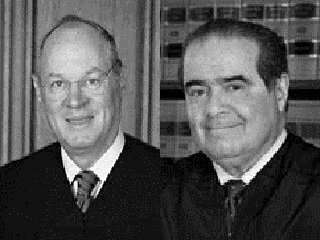As the Supreme Court nears a decision on same-sex marriages, observers of Court history have noted that June 26 already has special significance for decisions that have favored gay rights in landmark cases.
Update (6/26): The Supreme Court legalized a national right to same-sex marriages in a landmark decision.
 To be sure, the Supreme Court could issue a decision in Obergefell v. Hodges, the case that could clarify a national right for same-sex couples to marry, on Thursday, June 25, Friday, June 26, Monday, June 29, or possibly Tuesday, June 30.
To be sure, the Supreme Court could issue a decision in Obergefell v. Hodges, the case that could clarify a national right for same-sex couples to marry, on Thursday, June 25, Friday, June 26, Monday, June 29, or possibly Tuesday, June 30.
A decision on June 26, 2015 that favors same-sex marriage rights would fall in line with the two big decisions that set up the Obergefell case.
It was on June 26, 2003 that a divided Court said in Lawrence v. Texas that a Texas law making it a crime for two persons of the same sex to engage in intimate sexual conduct was unconstitutional.
And on June 26, 2013, a divided Court in United States v. Windsor said that the Defense of Marriage Act (or DOMA) was unconstitutional as a “deprivation of the equal liberty of persons that is protected by the Fifth Amendment.”
The opinions in the Lawrence and Windsor cases are key components in the Obergefell case. Justice Anthony Kennedy wrote the majority opinion in both cases, while Justice Antonin Scalia authored two significant dissents.
In the Lawrence case from 2003, Justice Kennedy said that the Texas law didn’t advance a “legitimate state interest which can justify its intrusion into the personal and private life of the individual.” But it was Scalia’s dissenting remarks that came back to play a role in a series of federal court decisions, made since Windsor, that struck down state-imposed same-sex marriage bans.
“[W]hat justification could there possibly be for denying the benefits of marriage to homosexual couples exercising ‘the liberty protected by the Constitution’? Surely not the encouragement of procreation, since the sterile and the elderly are allowed to marry,” Scalia wrote back in 2003, in “What justification could there possibly be for denying the benefits of marriage to homosexual couples?”
Again in 2013, it was Scalia’s words opposing Kennedy’s decision in Windsor that were later considered in the post-Windsor cases. Justice Kennedy, in the majority Windsor opinion, explicitly said the Court’s decision wasn’t ruling on same-sex marriage as a constitutional right. Scalia didn't agree.
“The real rationale of today’s opinion, whatever disappearing trail of its legalistic argle-bargle one chooses to follow, is that DOMA is motivated by ‘bare … desire to harm’ couples in same-sex marriages. How easy it is, indeed how inevitable, to reach the same conclusion with regard to state laws denying same-sex couples marital status,” Scalia said in 2013.
“It takes real cheek for today’s majority to assure us, as it is going out the door, that a constitutional requirement to give formal recognition to same-sex marriage is not at issue here,” Scalia said. “The only thing that will ‘confine’ the Court’s holding is its sense of what it can get away with.”
After the Windsor ruling on June 26, 2013, judge after federal judge referred to Scalia’s reasoning in Windsor and Lawrence.
John G. Heyburn, a federal judge in Kentucky, analyzed Scalia’s Windsor comments at length in his February 2014 decision striking down Kentucky’s same-sex marriage ban. U.S. District Judge Terence Kern in Oklahoma referenced part of Scalia’s dissent in Windsor as supporting the same-sex marriage argument, quoting Scalia’s comment that the Windsor majority decision “arms well every challenger to a state law restricting marriage to its traditional definition.”
In Pennsylvania, Judge John E. Jones III from U.S. District Court for the Middle District of Pennsylvania said “as Justice Scalia cogently remarked in his dissent, ‘if [Windsor] is meant to be an equal-protection opinion, it is a confusing one.’”
And in a June 2014 decision from federal district judge Barbara Crabb in Wisconsin, Scalia’s name was mentioned 12 times as she cited Scalia’s logic in the Lawrence and Windsor decisions.
As a historical footnote, two other major Supreme Court decisions were announced on a June 26th, but not related to same-sex rights.
On June 26, 1978, the Court ruled in Regents of the University of California v. Bakke affirmative action case, while on June 26, 2008, the Court ruled in the landmark District of Columbia v. Heller gun-rights case.







